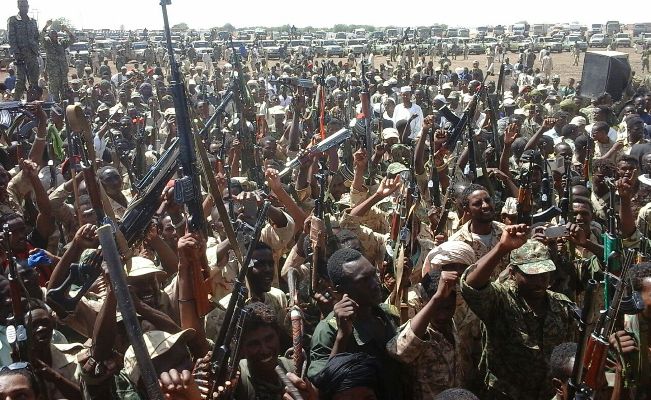Sudanese parliament passes RSF Act integrating militiamen in the army

January 16, 2017 (KHARTOUM) – Sudanese parliament Monday passed the Rapid Support Forces (RSF) Act which integrates the notorious militia in the Sudanese army and provides that its commander be appointed by the President of the Republic.
The paramilitary force was formed in August 2013 mainly from militiamen accused of war crimes against civilians during the counterinsurgency campaign in Darfur region. However, the National Intelligence and Security Services (NISS) defended their creation saying they have the same mobility as the rebel groups and can defeat them by using the same military tactics.
The RSF bill was filled to the parliament as one of the urgent changes that should be achieved before the start of the transitional period and the formation of the National Consensus Government agreed in the national dialogue conference.
The 30,000 militiamen in the past operated with the Sudan Armed Forces (SAF) in Darfur and the Two Areas but remained under the NISS command. The army which had complained about their indiscipline and adventurism, backed the reform hoping to control them as they are now part of the military system.
In statements at the parliament, Defence Minister Ahmed Awad Ibn Auf welcomed the RSF Act, pointing that “The development of fighting styles and types of crime besides the use of technology and the high skills of gangs and criminals, all these elements necessitate a change in the combat mindset”.
The minister went further to say that the country is facing several threats and there is a need for a mobile force that can move easily from a theater of war to another.
From his part, the RSF commander Mohamed Hamdan Daglo, (aka Hametti) said in accordance with this act they “have become a semi-autonomous force”, pointing to the possible extension of his force in the future to include air and naval forces.
The RSF Act provides that the President of the Republic who is the Commander-in-Chief of the armies appoints the commander of the militia.
Some MPs expressed fears about “the ambiguity” of the RSF Act on this regard, saying it does not clearly provides that they are under the command of the Sudan Armed Forces or the defence minister.
The defence minister, however, replied that the “RSF subordination to the commander-in-chief of the armies is not unusual because these forces are operating under the (same) military hierarchy”.
Before the adoption of the bill, it was reported that Hametti protested the integration of his forces in the Sudanese army, as he would lose his autonomy and financial advantages.
Speaking to the press after the endorsement of the act, Hametti said their movement “from an area to another in the past required different meetings (between the NISS, SAF) but now we can reach the border with Libya within 24 hours.”
“We are the soldiers of the people, and the law enables us to fulfil our duty as fully as possible,” he said.
The armed movements that fight the government in Darfur and the Two Areasn demand to dissolve the RSF militia, saying its elements should be accountable of war crimes in Darfur.
On a different register, Hametti also refuted the statements of the interior minister about the presence of foreign militias in Jebel Amir areas of North Darfur.
“The Jebel is secure and stable. There is nothing there, even if it is said by the interior minister or anyone else”.
(ST)
